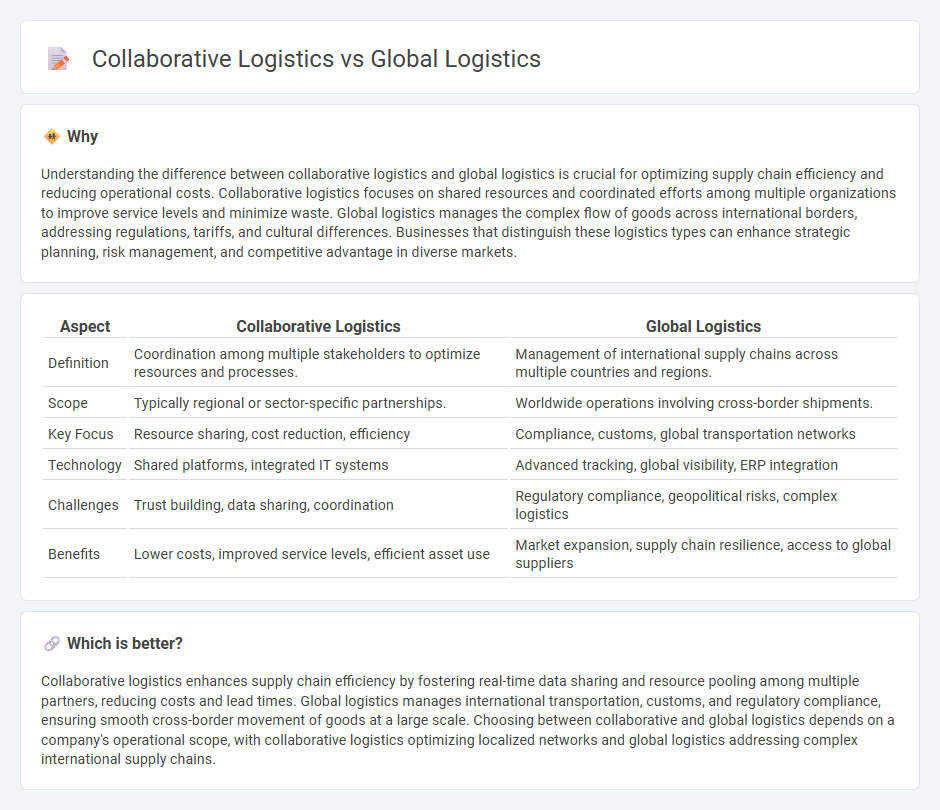
Collaborative logistics maximizes efficiency by integrating resources and sharing information among multiple stakeholders within a supply chain to reduce costs and improve service levels. Global logistics involves managing the flow of goods, information, and resources across international borders, navigating complexities such as customs regulations and diverse transportation networks. Explore how combining these logistics strategies can enhance operational performance and global reach.
Why it is important
Understanding the difference between collaborative logistics and global logistics is crucial for optimizing supply chain efficiency and reducing operational costs. Collaborative logistics focuses on shared resources and coordinated efforts among multiple organizations to improve service levels and minimize waste. Global logistics manages the complex flow of goods across international borders, addressing regulations, tariffs, and cultural differences. Businesses that distinguish these logistics types can enhance strategic planning, risk management, and competitive advantage in diverse markets.
Comparison Table
| Aspect | Collaborative Logistics | Global Logistics |
|---|---|---|
| Definition | Coordination among multiple stakeholders to optimize resources and processes. | Management of international supply chains across multiple countries and regions. |
| Scope | Typically regional or sector-specific partnerships. | Worldwide operations involving cross-border shipments. |
| Key Focus | Resource sharing, cost reduction, efficiency | Compliance, customs, global transportation networks |
| Technology | Shared platforms, integrated IT systems | Advanced tracking, global visibility, ERP integration |
| Challenges | Trust building, data sharing, coordination | Regulatory compliance, geopolitical risks, complex logistics |
| Benefits | Lower costs, improved service levels, efficient asset use | Market expansion, supply chain resilience, access to global suppliers |
Which is better?
Collaborative logistics enhances supply chain efficiency by fostering real-time data sharing and resource pooling among multiple partners, reducing costs and lead times. Global logistics manages international transportation, customs, and regulatory compliance, ensuring smooth cross-border movement of goods at a large scale. Choosing between collaborative and global logistics depends on a company's operational scope, with collaborative logistics optimizing localized networks and global logistics addressing complex international supply chains.
Connection
Collaborative logistics enhances global logistics by facilitating real-time data sharing and coordinated transportation across international supply chains, optimizing resource utilization and reducing operational costs. Integrating collaborative platforms enables seamless communication between multinational partners, improving shipment visibility and delivery accuracy worldwide. Efficient collaboration supports adaptive responses to disruptions in global logistics networks, ensuring timely distribution in diverse markets.
Key Terms
**Global Logistics:**
Global logistics involves managing the flow of goods, information, and resources across international borders to optimize supply chain efficiency. It encompasses activities such as transportation, warehousing, customs clearance, and regulatory compliance on a worldwide scale. Explore the benefits and strategies of global logistics to enhance your international operations.
Supply Chain Network
Global logistics emphasizes the efficient movement and management of goods across international borders, prioritizing transportation modes, customs compliance, and global supplier coordination within the supply chain network. Collaborative logistics integrates multiple stakeholders, including manufacturers, carriers, and distributors, to share resources and information, enhancing transparency, reducing costs, and improving delivery speed. Explore how leveraging collaborative logistics can transform your global supply chain network for greater efficiency and resilience.
Cross-border Regulations
Global logistics involves managing supply chains across multiple countries, navigating complex cross-border regulations like customs clearance, tariffs, and trade compliance to ensure timely delivery. Collaborative logistics emphasizes cooperation among partners to streamline these regulatory barriers through shared resources, real-time data exchange, and coordinated documentation processes. Discover how integrating collaborative strategies can optimize compliance and efficiency in international shipping.
Source and External Links
OIA Global: Home - OIA Global is a leading worldwide supply chain management company offering advanced logistics, packaging, raw materials management, and contract logistics solutions with a presence in 30+ countries and focus on resilient, adaptable services since 1988.
American Global Logistics - America's Best Logistics Company - American Global Logistics provides customized end-to-end global logistics, including ocean freight, customs clearance, compliance, and real-time shipment visibility to optimize supply chain efficiency and agility.
Premium Global Logistics for Time-Critical Needs - Ascent - Ascent Global Logistics specializes in truckload, less-than-truckload, global forwarding, air charter, brokerage, and expedited solutions, serving thousands of customers worldwide including Fortune 500 companies with over 430,000 annual shipments.
 dowidth.com
dowidth.com